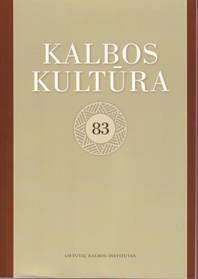Jaunimo požiūris į angliškus žodžius suaugusiųjų kalboje
Young people’s perception of English words in adult language
Author(s): Aurelija ČekuolytėSubject(s): Sociolinguistics, Baltic Languages
Published by: Lietuvių Kalbos Institutas
Summary/Abstract: Contemporary society is based on youth cult. We want to be young, modern and efficient. One of the ways to look modern and young is to speak youth language. Youth language differs from adult language. One of the differences arises from the inclusion of English words, or to be more precise, the use of certain English words, like nice, sorry, fuck etc. As evidenced by the results of a few surveys, adolescents are fully aware of typical features of youth language and they use such language only when speaking with other adolescents. But how will they reactwhen they hear an adult use in his/her speech certain English words that clearly belong to youth language? Moreover, will adolescents tolerate the use of such English words in public, for instance, on TV?The article presents an experiment known as The Matched Guise Technique, which was carried out in a secondary school in Vilnius. 55 pupils were asked to listen to recorded speech of five women and then describe the speakers. All the women indicated their age, so the respondents were aware of the speakers’ age. What pupils did not know was that one woman talked twice: the first time she talked plain Lithuanian (the Lithuanian guise), the other time she used threeEnglish words, namely, OK, sorry and nice (the English guise). The aim of the experiment was to investigate the pupils’ evaluation of the woman in the two different guises. The pupils were also asked to indicate the best and worst speakers and evaluate how the women would function as TV hostesses.The results of the experiment showed that only a minority of the respondents reacted negatively to the use of English words in the adult speech. They described the speech of the woman in the English guise as contrived and unnatural and noted that the language she used did not become a 40-year-old woman.However, the majority of the adolescents reacted positively to the use of youth English in the adult speech. The pupils described the women in the English guise as modern, efficient and young. They also hypothesized that such adults had many foreign friends and spent much time at the computer. The adolescents’ attitudes to English words in the adult speech show that they relate the use of such language to the modern lifestyle which resembles the young people’s lifestyle. Interestingly enough, the woman in the Lithuanian guise was described as a lovelyand self-assured mother who represented the traditional life style.As regards the question about which of the speakers they liked most, similar numbers of the pupils chose the woman in the English and in the Lithuanian guises. But when asked about the best TV hostess, the pupils gave preference to the woman in the Lithuanian guise reasoning that the use of English is not appropriate in public contexts. Obviously, the official Lithuanian language policy has an impact on the adolescents’ language attitudes.
Journal: Bendrinė kalba (iki 2014 metų – Kalbos kultūra)
- Issue Year: 2010
- Issue No: 83
- Page Range: 322-341
- Page Count: 20
- Language: Lithuanian

